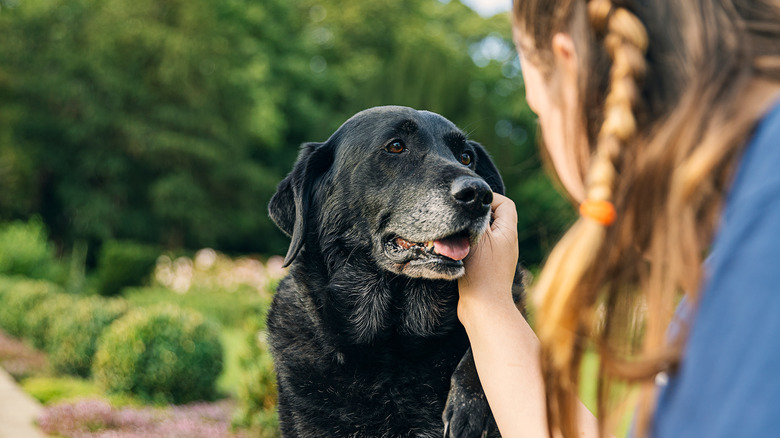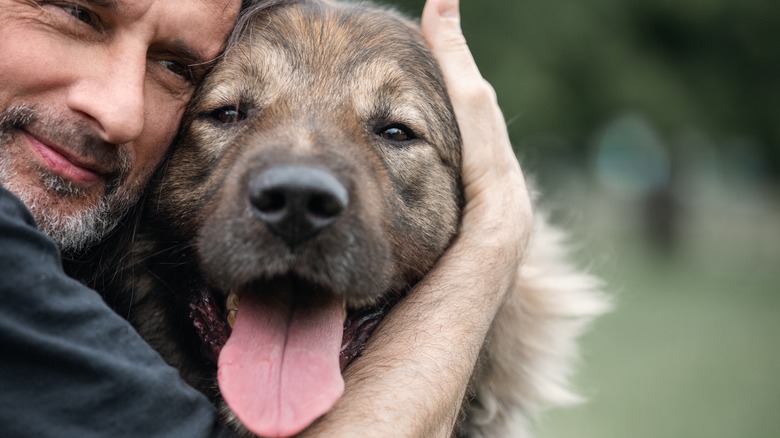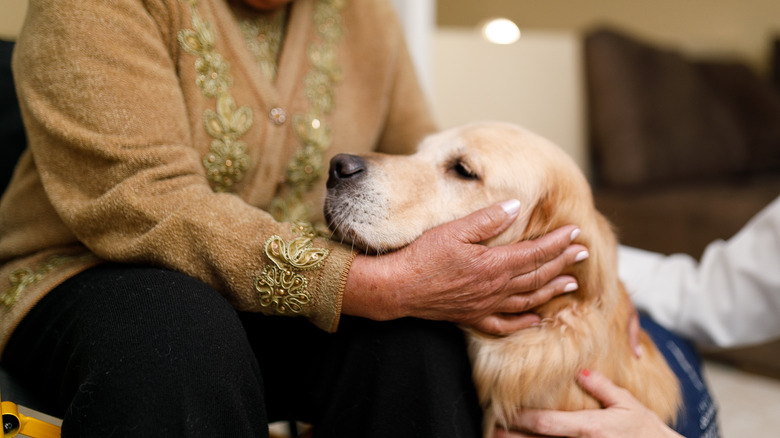Do Dogs Get Dementia?
As well as being potentially debilitating, diseases of dementia lead to impaired memory function and, in later stages, drastic changes to behavior and personality that can be painful to witness. Though as the generation known as the "baby boomers" become seniors there will be a greater number of people in the United States experiencing dementia, the good news is that recent studies suggest the overall proportion of people with it in the population is decreasing. And as the U.K.-based charity Alzheimer's Society makes clear, the world of medicine is advancing in leaps and bounds in terms of strategies to address the disease.
But it isn't just humans that have to deal with dementia. Indeed, people may encounter a similar condition in their household pets, most notably dogs — known among veterinarians as canine cognitive dysfunction, it's a common problem as they age. One recent study published by the Veterinary Clinics of North America: Small Animal Practice found that canine cognitive dysfunction occurs in between 14% and 35% of domestic canines over the age of 8, making it a source of serious concern for many dog owners.
Symptoms
Recognizing canine cognitive dysfunction in dogs can be tricky, as the condition can reportedly manifest in a variety of ways. Dogs with dementia can become noticeably disorientated, may forget their house training, or may change how they interact with their owners, along with other changes of habits.
Recent studies have revealed commonalities between human and canine dementia, such as insomnia — both humans and canines with dementia tend to experience a reduction in quality sleep as it progresses. Similarly, sundowner syndrome — the propensity for individuals with dementia to become disoriented or anxious toward the end of the day — exists in both dogs and humans.
Dr. Nicole Ehrhart of the Columbine Health Systems Center for Healthy Aging at Colorado State University shared a simple test of a dog's cognitive abilities in The New York Times: "Look at your dog looking into your eyes and see how long they hold your gaze, especially if you have a treat by your face." A lack of ability to focus — even when offered a tasty treat — may indicate that the dog is experiencing dementia.
What causes dog dementia?
As in humans, dementia in dogs is linked to the aging process, with the chances of a subject developing the condition increasing exponentially during the final quartile of life. Dogs of different breeds can have drastically different lifespans, with smaller dogs tending to live longer than large ones. Therefore, though previous studies have studied large samples of dogs over a certain age, the exact age range at which a dog is most likely to develop dementia is specific to its breed.
But as with humans, there are lifestyle factors that appear to play a part in canine cognitive health in later life. A 2022 study published in Scientific Reports found a link between inactivity among dogs and the prevalence of canine cognitive dysfunction, with the affliction revealed to be 6.47 times more likely among dogs that got less exercise.
Sadly, the study found that preexisting conditions such as deafness and blindness were also vectors in the increased frequency of dementia in dogs.
Treatments
Stories of canine cognitive dysfunction can be utterly heartbreaking. Take, for example, the story of Jimmy, a rescue dog whose owner Kira shared their experience dealing with dog dementia on the Burwood Vet website.
Throughout their years together, Jimmy and Kira had grown accustomed to sleeping in the same bed. However, as he got older, Jimmy went through a sudden and noticeable behavioral transformation, becoming agitated at bedtimes and seemingly unable to stick to his usual sleep routine. He soon became confused on walks, turning in circles instead of walking in a straight line, and eventually lost his appetite. A vet diagnosed Jimmy with canine cognitive dysfunction, a heartbreaking development for Kira. But thankfully there were available treatments, and in this instance the vet chose a three-pronged approach to alleviate Jimmy's symptoms — a combination of medication, dietary supplements, and stimulating activities such as games. Meanwhile, Kira was encouraged to take a gentler approach to her dog in their interactions and on their walks to lessen Jimmy's anxiety.
Though several treatments are available that might help reduce the symptoms of dog dementia, there is no guarantee that any of those suggested may work with any particular dog, and the strategy of many pet health professionals tends to be trial and error to see what a certain patient might respond to. Sadly, however, there is no entirely effective cure for canine cognitive dysfunction.
Preventatives
We are often told that keeping our brains active through engaging activities such as reading and doing crossword puzzles will help keep it healthy as it ages. But what can be done to help prevent canine cognitive dysfunction?
Based on the 2022 Scientific Reports study, it would seem that keeping your pet dog active is a key preventative against cognitive decline. However, the study was limited to questionnaires of dog owners, and though exercise levels and brain health in dogs seemed to be linked, it was not conclusive whether the effect was causal.
Nevertheless, veterinarians suggest that exercise remains central to maintaining a healthy lifestyle in dogs, which — along with socialization with both humans and other dogs and mental stimulation — is key to maintaining a healthy brain in canines' final years. Good nutrition, including supplements, can also maintain cognitive health, while in later years, it is important for dogs to enjoy regular daily routines and a stress-free environment.
Impact on longevity
There aren't many upsides when it comes to dementia, whether in humans or beloved animals. However, in the case of canine dementia, there does appear to be something of a silver lining.
In 2013, researchers at the Department of Clinical Veterinary and Animal Sciences at the University of Copenhagen undertook what they described as "An Observational Study with Long-Term Follow-Up of Canine Cognitive Dysfunction: Clinical Characteristics, Survival, and Risk Factors." Among their findings — which were published in the Journal of Veterinary Medicine — was the confirmation of a pattern in behavioral changes in senior dogs with canine cognitive dysfunction, such as loss of appetite and sleeplessness.
But the study — limited though it was — was unable to find any direct causal effect between dog dementia and shorter life expectancy: As far as they could tell, dogs that develop canine cognitive dysfunction seem to live as long as those without it. Canine cognitive dysfunction is common, but with the patience and understanding of their owners, senior dogs with dementia can still live long and happy lives of comfort.





